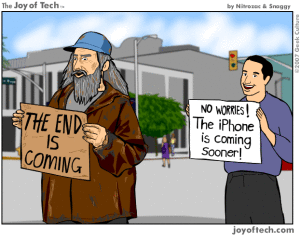 You have owned an iPhone 4 since it came out. You accessorized it with different covers, a wall-charger, and even a car-charger. Then in October 2011, the iPhone 4S emerges. Suddenly, you want the new iPhone, you need the new iPhone, you envision the new iPhone in your hands. So you upgrade, and you get rid of your (suddenly) old model. The newer version is minimum two hundred dollars with a two-year contract, you add on insurance (just in case), and a new cover or two.
You have owned an iPhone 4 since it came out. You accessorized it with different covers, a wall-charger, and even a car-charger. Then in October 2011, the iPhone 4S emerges. Suddenly, you want the new iPhone, you need the new iPhone, you envision the new iPhone in your hands. So you upgrade, and you get rid of your (suddenly) old model. The newer version is minimum two hundred dollars with a two-year contract, you add on insurance (just in case), and a new cover or two.
You are content… until the iPhone 5 comes out in 2012, and then the cycle repeats.
This scenario is familiar to many people who like to keep up with the latest trends. It is a cycle of replacing and upgrading perfectly usable objects that we own, and it is a result of ‘perceived obsolescence’. Perceived obsolescence is a concept that explains how we believe that the items we own, that are still usable, have suddenly become ‘obsolete’. They cannot be used anymore because there is a better, newer, and more functional version out there. Remember the first version of the iPhone? It has become so obsolete that the concept of buying and using one now is laughable.
However, perceived obsolescence applies to more than just iPhones; it applies to any material object that we buy. Down the line, we decide that we want to get rid of these objects because they are no longer trendy; this includes clothing, electronics, and even home décor.
The Quran tells us how we have become so distracted with material objects:
“Competition in [worldly] increase diverts you, until you visit the graveyards,” (Quran 102:1-2)
Do we wish to spend all of our lives racing to accumulate material goods and benefits that will never bring us true satisfaction? Although it is exciting to receive a new iPhone, how long until we get bored and decide that we want something better, newer, and more expensive? We spend countless hours per week working, only to spend a great percentage of our paycheck on things that we do not need.
As for the solution, are we supposed to shun all material aspects of this life and deem them haram (prohibited)? No, not necessarily. But we do need to realize that the problem is not in the practice of being consumers, but in the actual mindset of consuming. We need to learn how to alter our perspective and realize the difference between wanting something and needing something. Of course we all know the actual difference between wanting and needing, but the line between these two concepts becomes fuzzy when we desire the wrong things. We begin to believe that we actually need the new iPhone, video game console, or pair of jeans, even though we simply want it and in reality, our life would not crumble or fall apart without it.
As Yasmin Mogahed reminds us: “Remember that everything in this life is only a glimpse. Love, beauty, happiness are only imperfect approximations. Only the dunya (worldly) version of these things. Seek the Real thing […]”
The line between the ‘real thing’ and ‘approximations’, however, has become blurred. We have become so bombarded with advertisements that lure us into believing we want things that we do not even want. Men are convinced that if they buy a certain cologne they will look as handsome as the model wearing it, and women are convinced that if they buy a certain mascara they will have eyes as beautiful as the model’s, even though both the male and female models in the advertisements have been heavily photoshopped. Many times we believe the advertisement, we fall for its promises, its deceptions, its lies, and we buy the cologne, the mascara, the jeans, the camera—anything and everything that is advertised these days. We buy the product, we may use it for a while, and eventually it becomes clutter that fills up our homes and our lives. Eventually our homes and our minds become so stuffed with clutter and things that we do not need that our values become inflated as well. We forget what is important and what is not.
Remember our main goal in this life: to serve Allah subhanahu wa ta`ala (exalted is He), and to reach jannah (heaven) in the real, everlasting life. Enjoy the beauties of this world because they are gifts from Allah (swt) but do not be led astray by them. The less stuff we have, the more grateful we will be for the things we do have.
Studies have shown that truly happy purchases are not material objects, but experiences that we create. These types of purchases create memories that will never be forgotten, that we can carry with us at all times, and that will never clutter up our shelves.
 navedz.com a muslim's Quest for the truth
navedz.com a muslim's Quest for the truth









Very inspiring article. I have a very old laptop and I am quite satisfied. I can benefit from its service of recitation. Shaitan diverts our attention from the path of wisdom at all times and lure us to the worldly and often mirage like attractions. We can seek the Guidance and Mercy of Allah(SWT) to Protect us from his snares always(Ameen). Thanks for the timely reminder.